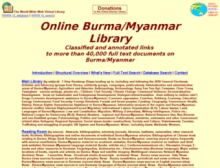Resource information
Summary: "As part of its transition to democratic reform, in October 2014, the Government of Myanmar released a draft national land policy and plans for a subsequent Land Law, for public consultation. The importance of this cannot be understated and Global Witness welcomes both the potential for a strong codified framework for land, and the opportunity for public participation. It is crucial, however, that consultation is meaningful and genuinely participatory, and the resulting feedback is incorporated into the policy and Land Law in a process that is fully transparent. What’s more, the final land policy and subsequent land law should be robust and in line with international standards, most notably, the UN Voluntary Guidelines on the Responsible Governance of Tenure of Land, Fisheries and Forests1. The guiding principles of the draft national land policy state that its objectives are to ‘benefit and harmonize the land use, development and environmental conservation of the land resources of the State, to protect the land use right of the citizens and to improve land administration system.’ This aim is extremely welcome as an essential step in achieving the urgently needed reforms in the country’s land governance. However what is notably absent from the policy is a clear roadmap of priorities to be addressed: genuine sustainable development should prioritise the land and user rights, livelihoods and food security of its population, followed by participatory land-use mapping to help guide decisions around the management and use of land. Only then should an assessment be made of what is required in terms of land investments and what, if any, areas of land should be allocated for commercial investment purposes. In its current form, however, the draft land policy makes no reference to poverty alleviation or food security, and instead appears to be openly promoting commercial investment in large-scale projects, potentially at the expense of Myanmar’s rural smallholders – the majority of the population. The draft land policy has come under criticism for being pro-business; however, industry should still remain cautious about the reforms being proposed. In its current form, the draft policy presents an uncertain legal landscape which requires much clarification, particularly on several contradictory articles on how land and user rights will be protected. Insecure land and user rights can present a financial risk to both governments and companies as demonstrated through recent research at the global level: both The Munden Project2 - a global think-tank working on finance and sustainability - and the international coalition group Rights and Resources Initiative have demonstrated the financial risk to both governments and businesses associated with land investments in countries where tenure rights are unclear through a number of global case studies. It is therefore recommended that the Government of Myanmar, with the assistance of its development partners, revise the current draft of the land policy to ensure it has clear aims and objectives, and is based on international standards in particular, the UN Voluntary Guidelines of the Responsible Governance of Tenure of Land, Fisheries and Forests in the Context of National Food Security.



